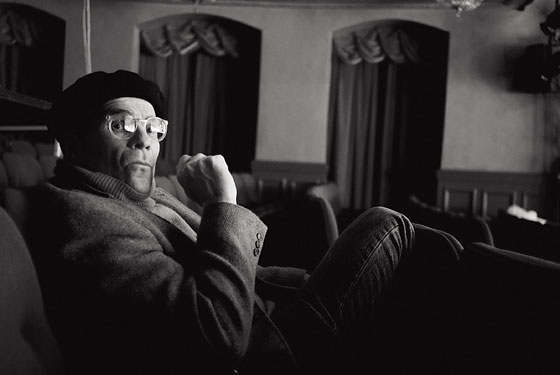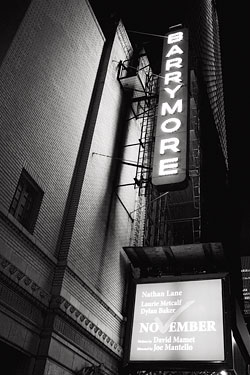
When the star of The Producers decides to play a U.S. president in a Broadway play written by David Mamet (November, opening January 17), is it any wonder he becomes a desperate con man? Mamet, whose last play was the 2005 courtroom farce Romance, deliberately got this new comedy up as early in the primary season as possible. But Nathan Lane’s president, Charles H.P. Smith—a cash-poor incumbent on the verge of losing reelection—looks a lot more like a certain lame duck than like any of the current White House contenders. And Smith is in a venal class all his own, deploring the job as “too much stress, too little opportunity for theft,” and lighting on the annual Thanksgiving-turkey pardon as a potential fund-raising scheme. Mamet may not have expected the primary season’s latest surprises, along with all the expressions of hope (Change! Change! Change!) that make scandal-a-minute 2006 (amply referenced in November) seem like a long-ago nightmare. But then, he’s got a surprisingly positive take on the political process—which he laid out for us, albeit in broad terms (just don’t ask him to endorse a candidate).
So what made you decide to write a comedy set in the Oval Office?
Like a lot of other Americans, I’ve gotten very interested in politics lately.
And what do you make of the primaries?
I was shocked, after Iowa, to find myself thinking, Well, you know, if there were the two candidates, McCain and Obama, either of them would probably make a hell of a president.
And what about Hillary’s tearful turnaround?
Well, I only heard something on the radio. I don’t think I’m misquoting her. She said, “I have so many opportunities for America.”* [Long pause.] That’s kind of wonderfully revelatory. It’s not that there are so many opportunities for America, but she has so many opportunities for America.
Will you be voting in the California primary, and for whom?
Of course I’m going to be voting. I’m entitled to my political opinions, and I get to vote because I’m an American. But I’m not the guy to ask about politics. I’m a gag writer.
But you write about politics—especially your strong pro-Israel stance—on the Huffington Post and in books.
If you’re writing an opinion piece, it’s your job to write your opinion. If, on the other hand, you wrote a novel, as Virginia Woolf tells us, it would be inappropriate if you let your novel be influenced by your political opinions.
But they certainly influence November. Your president started a war in Iraq, detains citizens illegally, “fucked the country into a stuffed hat,” and has poll numbers in the toilet. Sounds like some classic Bush-bashing.
It’s very clear from the first moment that it’s not a play about George Bush. He’s an incumbent who’s running for a second term, that’s the whole gag of the play.
Do you think there’s any correspondence between your play and what’s going on right now?
For a long time, I felt politicians were stealing my material. I wrote Wag the Dog and then that scandal followed. I guess plagiarism is the sincerest form of thievery.

But how do you see life imitating November?
Everything changes. I mean, that’s the great thing about politics. It’s like fighting a war. No plan ever outlives the first encounter with the enemy.
But Nathan Lane plays a deeply cynical president, and a lot of people seem relatively upbeat about politics right now.
It’s not a cynical play. I might flatter myself by calling it a populist play, because there’s one polemic going on between the president, who’s unutterably corrupt, and his speechwriter, who’s in his view unutterably naïve. At one point she says to him, “People say we’re a country divided, but we’re not a country divided, what we are is a democracy.” And I think that is the meeting ground of the two positions. That the only country that’s not divided is totalitarian.
That almost sounds like something Aaron Sorkin would write for The West Wing. Sorkin owes something to your style. What did you think of that show?
I thought it was a great show. Listen, the essence of any television show is to take people backstage and stick them with a group of people we’re told are special. We can call it the White House or Delta Force or cops or doctors. But it’s the same idea.
So do you enjoy writing your own show—The Unit—for TV?
It calls on a lot of skills that I have, a lot of skills that I don’t have, and some skills I’ll never have. But it’s different. It’s like in the Book of Job—where all the comforters said x, y, and z happened and “only I am escaped to tell thee.”
Um, how is it like that?
I’m sure it’s like childbirth: You just can’t understand it until you’ve done it. Because it combines the rigors of making a movie with the rigors of running a widget factory.
Okay. But you do consider theater more important than television?
No. I do it for a living. I would rather go see The Music Man than The House of Bernarda Alba. And I’d rather go see Our Town than Long Day’s Journey Into Night. Because they partake of entertainment. You’ve got to put the asses in the seats and keep them there.
You also directed a Ford commercial. Why?
I did it for the money. Why do you think I did it?
And you needed the money that badly?
Well, it’s nice to have, because you can buy things with it.
So the whole business of “selling out,” you think it’s bullshit?
No, of course it’s not bullshit. One is faced with that every day. All of us. What’s a moral choice, what’s not a moral choice, and so forth. Somebody even more pedantic than I might say that that’s the whole question of drama: How does one make a moral decision? And further, that a moral decision is not the choice between wrong and right—that’s easy—but between two wrongs.
You’re almost starting to sound cynical again.
The good news is it’s a spectacular country. We’ve been around for 230 years in spite of human nature, because that’s what the Constitution is all about. It’s saying, of course everyone’s gonna try and take control. Of course they’re gonna subvert every law that’s supposed to keep them in line. Of course the president is gonna want to be imperial, of course Congress is gonna want to become obstructionist, of course the judges are gonna be activist. Duh. They figured this out in 1787 and drew up a few sheets of paper that have kept the country in line. It’s a great place to live.
SEE ALSO:
Nathan Lane Thrilled to Finally Play a Man
*While this quotation was attributed to Clinton, it was later reported that she said, “I have so many opportunities from this country.”
